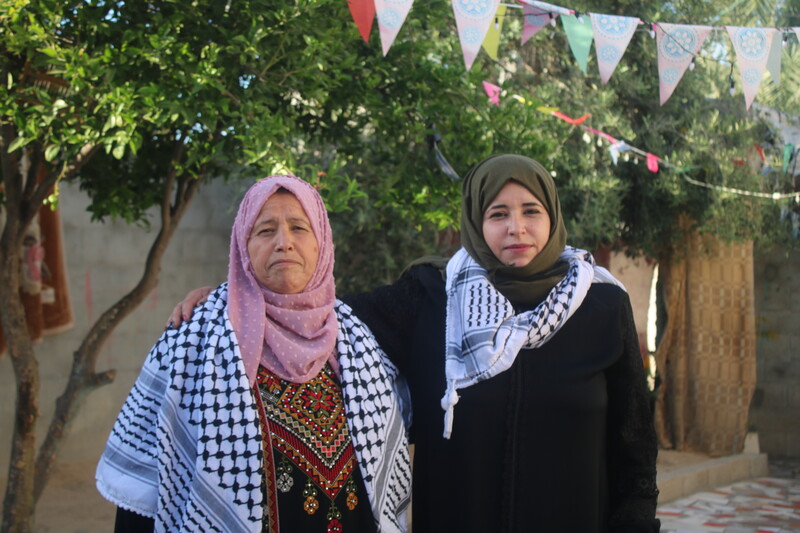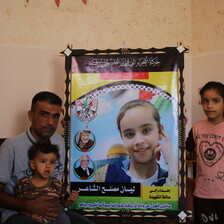The Electronic Intifada 31 August 2021

Samar and her mother, Um Jihad, in their garden in Gaza.
Samar Abu Daher still cannot believe that her horrifying nightmare is finally over.
In April, after nearly three years in an Israeli prison, the 38-year-old was finally freed to be with her family again.
She had been locked up on what she insists were trumped up charges of aiding her brother, Jihad, before he was imprisoned in 2007.
Jihad was sentenced to 23 years in prison, charged with being an operative with Islamic Jihad. He still has nine years to serve.
Eleven years after his imprisonment began, the Israeli military apparently decided that his punishment was not enough.
On 6 December, 2018, Samar left Gaza to accompany another brother, Eyad, who has a medical condition affecting the arteries of his heart. The two planned to travel together to Al-Makassed hospital in occupied East Jerusalem.
They had all their paperwork in order and neither could know how long Samar’s journey would turn out to be and how terrifying an ordeal it would become.
“We were prepared,” Samar told The Electronic Intifada. “I had been interviewed by the Israeli authorities and was granted a permit to travel to Jerusalem with my brother.”
With their worries firmly fixed on Eyad’s heart surgery, the unsuspecting siblings went to the Erez military checkpoint, the principal way to Israel or the occupied West Bank from Gaza.
Once they reached the Israeli side, however, two soldiers approached Samar and took her to an interrogation room.
“I didn’t know what I was being held for. They asked me many questions that I had no idea about and then they let me wait for hours,” said Samar.
Surgery deferred
At first, she said, she was simply worried about getting to her brother’s surgery on time. But the questions continued: about her family, about Jihad.
The longer it went on, the more worried and nervous she got. At one point, she said, she even lost consciousness from the stress. After nine hours of this, she found herself hand- and foot-cuffed in the back of a prisoner transport.
“I was shocked and passed out. All I remember is that when I woke up, I was in the prisoner transport vehicle, far from my brother.”
For his part, Eyad was prevented from traveling and sent back.
Extremely concerned about what might happen, Eyad’s family was reluctant to try to apply for another permit in order to send him back through Erez.
As a result, the 32-year-old has yet to undergo surgery. He remains dependent on painkillers and tranquilizers to get through each day.
Last year, Israel arrested 10 people trying to cross through the Erez checkpoint.
Abdel Nasser Ferwana of the Palestinian Authority’s ministry for prisoner affairs said that the Israeli military is exploiting the urgency of some to travel for medical treatment.
“The Israeli occupation authorities have turned the Erez crossing into a trap,” Ferwana told The Electronic Intifada. “They give the patients and their companions travel permits, then arrest them at the crossing and bring false charges against them.”
Since Israel began blockading the Gaza Strip in 2007, the number of Palestinians traveling out of Gaza through Erez checkpoint is down significantly, and then mostly to seek medical treatment.
With the outbreak of the COVID-19 crisis at the beginning of March 2020, Israel banned almost all travel through the Erez checkpoint except for some critically ill patients and their companions. In August, however, some Palestinian businesspeople were allowed to resume travel and two were “arbitrarily arrested” on 23 August, according to the human rights organization Al Mezan.
Desperate conditions
Being held at Erez was just the first part of a nightmarish time for Samar.
From the very first few months at Ashkelon prison, where she was held, Samar started to suffer from symptoms related to hypertension and diabetes. These are conditions for which she has no family history, and she is convinced that the stress of incarceration brought them on.
She was also subjected to physical violence. On one occasion, prison guards came to collect Samar’s cellmate. Terrified, the cellmate resisted, clinging onto Samar, who was attacked with a baton.
“We were terrified when the Israeli jailers entered the cell. We shouted at them to leave us alone, but one of them hit me with the stick on my hand and dragged my friend by her hair out of the cell,” Samar said.
Samar stated it was not the only time she was physically assaulted, but that it happened regularly, especially when inmates were protesting for rights they are often denied in Israeli detention, like regular visits, better access to health care or more hygiene products.
She did not receive many visits from her family during her time in prison. In fact, only her mother, Um Jihad, was allowed visiting rights, and then only four times during the nearly 30 months she was in detention.
And each visit was onerous, not only for Um Jihad, but also for Samar. Rather than bringing her mother to Ashkelon, not far north of Gaza, Israel’s prison authorities transferred Samar to the Beersheba prison complex much farther away in the Sinai desert.
In all, the journey would last three days, Samar said – one day to bring her, one day in Beersheba where she would get to see her mother for just one hour, and one day to return.
The long commute itself wore her out. Prison transports do not have comfortable seats. Even the guard dog, she noted, was more comfortable in the bus.
An ongoing nightmare
At crossroads, she was harassed by passersby she identified as settlers who would often swear at her if they saw her.
“Every time settlers saw me in the bus window, they shouted the dirtiest words which they learned just to harass Palestinian women,” Samar said. “I wanted to close my ears, but my hands were cuffed.”
The COVID-19 pandemic then saw the Israeli prison authority cancel prisoner visits altogether. Prisoners were left with only phone calls to stay in touch with their families, and even they were not always allowed.
“We could not easily get any of our rights in prison. I asked the prison administration several times to allow me to make a phone call to my family, but they refused, so I decided to refuse my medications as a way to agitate for my rights,” Samar said.
Even after her release, her trials were not quite over. Israel’s assault on Gaza began less than a month after her return, and the family, whose house is close to the Gaza boundary, split up for safety reasons after only just being reunited.
“The war was an exceptionally difficult time for me,” Samar said. “I really did not know how to recover from my experience in prison or the war that separated me from my family again.”
Samar is still traumatized. She has recurring nightmares that wake her up during the night.
“Every morning my daughter wakes up terrified. Sometimes she will scream: ‘Did they come to count?’” said Um Jihad.
Samar would have been regularly woken up in prison by guards doing head counts. Her sleeping mind clearly still takes her back to that, her mother believes.
“I just hug her and remind her that she is no longer in prison,” Um Jihad said.
Abdallah al-Naami is a journalist and photographer living in Gaza.





